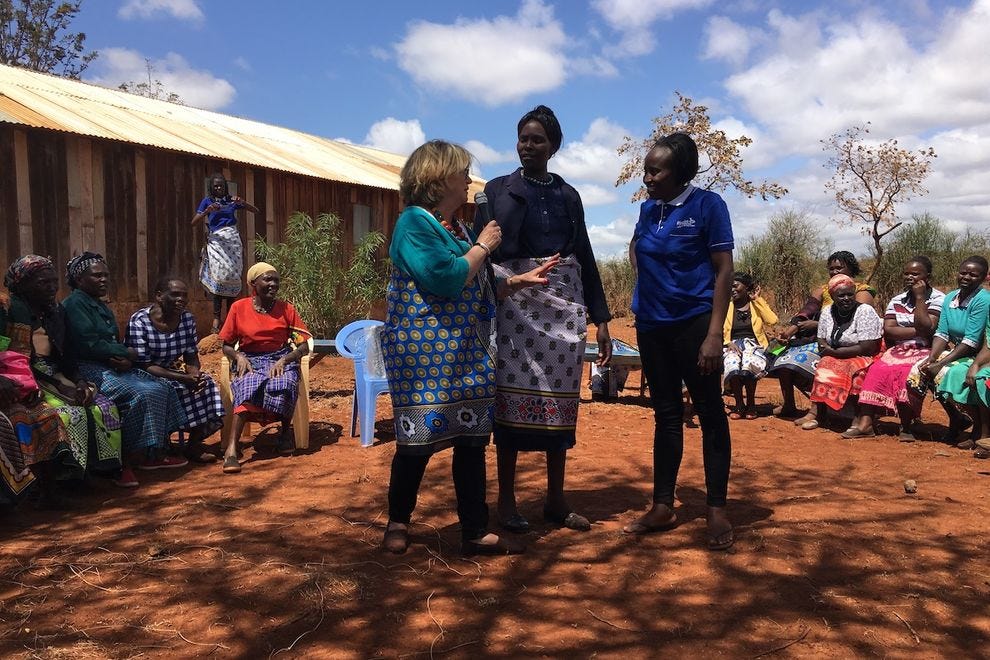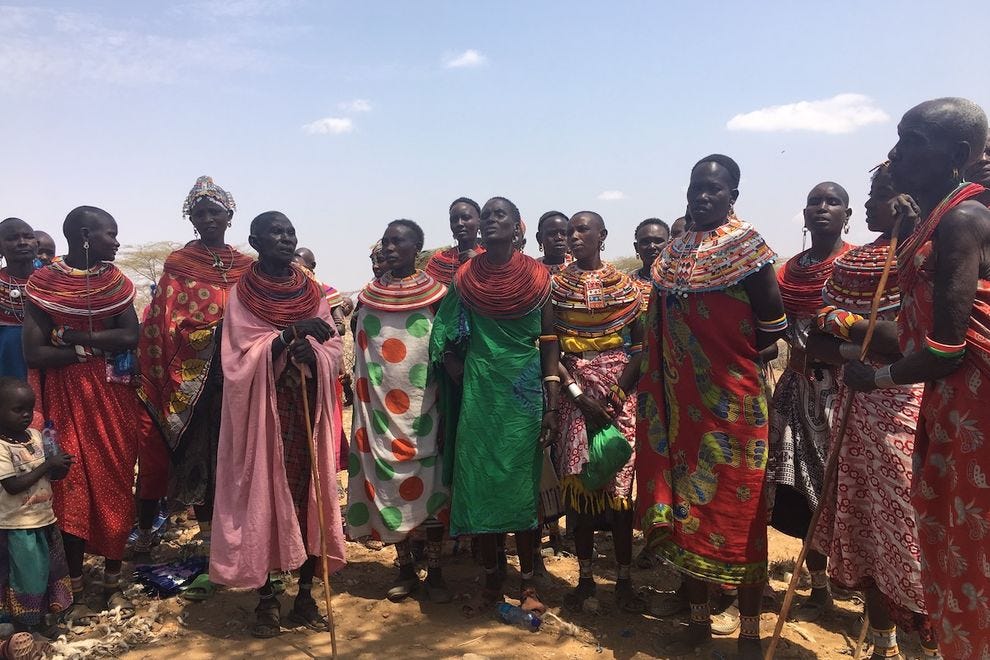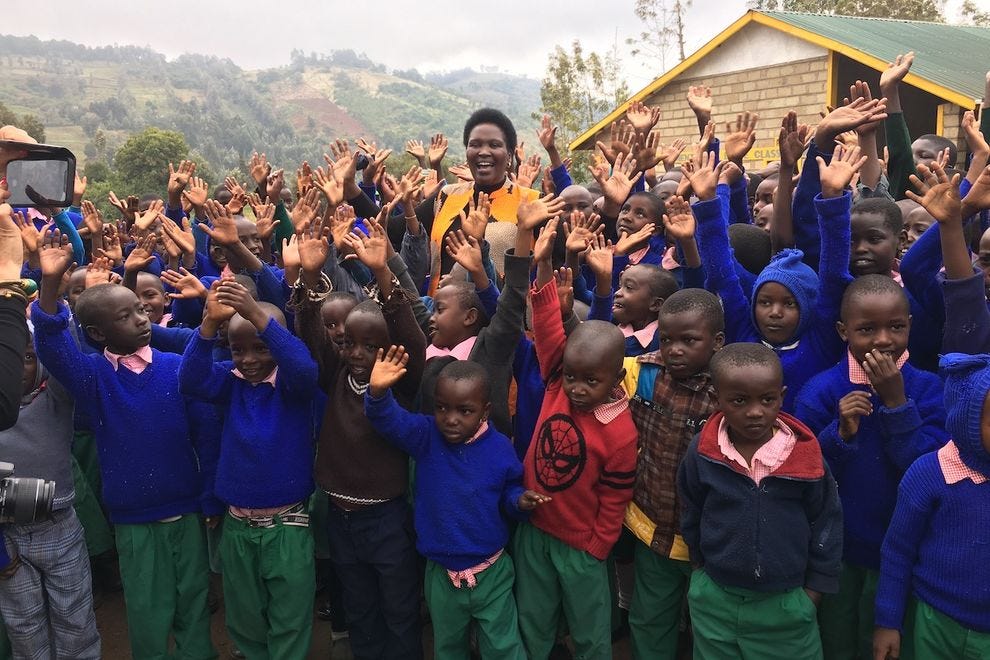Products You May Like
 Linda Higdon leading a sacred women’s circle in Kenya — Photo courtesy of Lois Alter Mark
Linda Higdon leading a sacred women’s circle in Kenya — Photo courtesy of Lois Alter Mark
There’s no force as powerful as the global sisterhood, according to Linda Higdon, founder of Women’s Journey to Kenya. It’s a one-of-a-kind, 16-day trip to Africa designed to introduce women of very different cultures to each other to understand how alike they really are – and to possibly change the world together.
The former classical pianist turned photographer/filmmaker/activist/philanthropist has been working with the women of Kenya for almost two decades. And she is passionate about sharing their stories with Western women whose lives are completely foreign to them.
She decided to connect the two through Women’s Journey to Kenya in 2016, acting as tour guide and offering small groups of women (mostly from the United States and Canada) an otherwise impossible opportunity to get to personally know the women of Africa. She now leads trips twice a year with her husband, Paul, and wishes other women in the travel industry would follow her lead and replicate her model in different countries.
 Linda Higdon and some of the village women — Photo courtesy of Paul Higdon
Linda Higdon and some of the village women — Photo courtesy of Paul Higdon
“There is nothing that can’t be accomplished when women come together,” said Higdon. “The first step, though, is realizing that we all want the same basic things. We want our families to be safe and healthy and happy.”
I went on Women’s Journey to Kenya last summer and was profoundly changed by the experience. I forged deep friendships with some of the women I traveled with and also with some of the Kenyan women I met.
It was, hands down, the most intense and emotional trip I’ve ever taken, but also one of the most fun. I laughed, I sobbed, I was pampered and I saw incredible beauty.
And I have never been hugged as much as I was during my three weeks in Kenya.
I hugged my way through Kenya — Photo courtesy of Lois Alter Mark
Every time we met someone, we were greeted as though we were family members. The women in each village welcomed us with dances and songs, and let me assure you, these women can dance you under the table.
They graciously invited us into their homes and they showed us how they did their daily chores. We tried to put ourselves in their shoes and carry water on our backs – which they do for miles – much to their amusement.
 The village women were not impressed with our skills — Photo courtesy of Lois Alter Mark
The village women were not impressed with our skills — Photo courtesy of Lois Alter Mark
We spent a lot of time in remote villages talking to local women through a translator, and those are conversations I will never forget. At one point, I mentioned that I don’t cook and the women, looking horrified, gasped and turned to each other in shock. The American women found this reaction hilarious.
A highlight of the trip and one of the most surreal experiences I’ve ever had was sitting in a sacred women’s circle in the middle of the African desert, talking to the Samburu women, who I had previously only seen photos of in magazines like National Geographic.
 Meeting the Samburu women was a once-in-a-lifetime experience — Photo courtesy of Lois Alter Mark
Meeting the Samburu women was a once-in-a-lifetime experience — Photo courtesy of Lois Alter Mark
They were strong, proud and draped in stunning beaded jewelry they had made themselves, and yet we talked intimately and candidly about men, marriage and, especially, divorce. They were fascinated by the idea of divorce and asked so many thoughtful questions, trying to comprehend how women could be single and what happened to the children.
What was most apparent in all the groups of women we met was the fact that they took care of each other and were fiercely protective of their community. While their husbands were out “working” (the truth is many of them do nothing but drink all day), the women helped each other take care of the children and feed their families – a huge challenge when the country is suffering from a severe drought. Their sisterhood was, literally, their lifeblood.
 My new friends, including Dr. Esther Mbaabu (right) — Photo courtesy of Lois Alter Mark
My new friends, including Dr. Esther Mbaabu (right) — Photo courtesy of Lois Alter Mark
We also spent time with women who are changing lives. We met Mercy Chidi Baidoo, one of Kenya’s leading child rights activists, founder of Ripples International and co-leader of “160 Girls,” an historic landmark case to protect girls from rape.
And we met Wahu Kaara, a Nobel Peace Prize nominee for her work to fight poverty; Wendo Sahar Aszed, founder of Dandelion Africa, who is teaching boys about rape and female genital mutilation in order to prevent both.
We also met my beloved new friends, Lucy Mukaria, women’s rights legislator and champion of Ribui Primary School, and Esther Mbaabu, who holds a Ph.D. in women’s land rights and works closely with Balm Touch, a group of women tea farmers.
 Lucy Mukaria and the students at Ribui Primary School — Photo courtesy of Lois Alter Mark
Lucy Mukaria and the students at Ribui Primary School — Photo courtesy of Lois Alter Mark
We read to students at two elementary schools, held orphaned and abandoned babies at the New Start Center, played with rescued street boys at Hope House and hugged rape victims (some as young as four years old) at Tumaini Center for Abused Girls.
We took a sobering walk through Kibera, one of the biggest slums in the world, only to be awestruck by the students at SHOFCO, a global showcase for girls’ education. These smart, funny, curious girls offer so much hope for the future and are empowering in themselves.
I don’t know how the women and children we met are able to maintain hope and even joy in such extreme poverty – but they do. They loved seeing themselves on our phones, and we took endless selfies because watching their faces light up was such a delight.
 The kids loved taking selfies – and so did I! — Photo courtesy of Lois Alter Mark
The kids loved taking selfies – and so did I! — Photo courtesy of Lois Alter Mark
This trip taught me that smiling and hugging are universal languages and that wealth is about so much more than money. We all have something to learn from each other, and I often think of Wendo Aszed’s story about visiting the U.S. and crying when she saw an elderly woman out in the rain.
“We would never let someone stay outside like that,” she said. “We would invite them in to dry off and have something to eat.”
Whose lives are richer?
Let me make clear that Women’s Journey to Kenya is not a mission trip. It has nothing to do with religion. Or charity. Or trying to save anyone.
It’s all about connecting women with women.
Not only is that enough; it’s everything.

